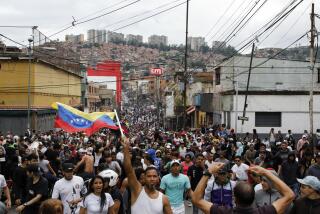Unofficial Count Gives Fujimori Victory in Peru
- Share via
LIMA, Peru — Supporters of President Alberto Fujimori won a majority Sunday in a new Congress that will replace the one he shut down in April, according to unofficial returns.
The largely peaceful congressional elections strengthened Fujimori’s control over this troubled country’s political process, signaling support not only for his unconstitutional seizure of dictatorial powers but also for his plan to tailor a new constitution to his liking.
Fujimori predicted that the new Congress will work in harmony with his government. “On the main problems, an ample majority will be obtained,” he said at a news conference, hailing the elections as “the emergence of a new political panorama in Peru.”
The 80-member Democratic Constituent Congress is to rewrite the constitution and perform other legislative functions until the end of Fujimori’s term in 1995.
While results were not officially tabulated Sunday, the polling firm APOYO compiled returns from 100% of the ballot boxes showing that the president’s Cambio (Change) 90 Party and allied independents won 38.3% of the votes, good for 44 seats in the new Congress. APOYO’s figures gave only eight seats to the Popular Christian Party, the main opposition party in the contest.
Other seats were spread among seven parties, groups and movements. Enrique Elias, a university professor and political analyst, said that some of these groups are likely to support Fujimori.
“I think the majority for the government . . . is going to be greater, quite a bit greater, than it looks like (now),” Elias said.
Several major opposition parties--including the American Popular Revolutionary Alliance of immediate past President Alan Garcia and the Popular Action party of former President Fernando Belaunde Terry--refused to take part in the congressional contest, calling it a farce.
APOYO put blank and spoiled ballots at 22.7%. That is higher than historic levels, apparently due to efforts by some opposition parties to encourage voters to nullify their votes in protest.
More than 11 million Peruvians were registered to vote, and local news reports said that turnout appeared to be high.
Jaime Yoshiyama, leader of the Cambio 90 ticket and Fujimori’s former energy minister, declared a “great, great triumph” for pro-government forces. “We have received great support from the Peruvian people,” Yoshiyama told a news conference Sunday night.
Fujimori, elected in 1990, has been ruling by decree since April 5, when, with military backing, he dissolved the Congress, going against the democratic grain of today’s Latin America. He scheduled Sunday’s elections under international pressure, including strong urging by the United States, which has suspended much of its economic aid to Peru.
Over the objections of Peru’s major political parties, however, Fujimori postponed scheduled municipal elections until January. Former President Belaunde went to the polls Sunday but made a show of not voting “as a protest over the fact that municipal elections are not being held.”
When Fujimori closed the old Congress, he charged that corruption and blind opposition by politicians from the major parties were blocking his efforts to revive Peru’s impoverished economy and combat the ruthless Sendero Luminoso (Shining Path) guerrilla movement.
During the week before the elections, the fanatical Maoist guerrillas conducted a terrorist bombing campaign aimed at disrupting the voting. The offensive also was apparently intended as a show of strength 10 weeks after the capture of Sendero’s top leader, Abimael Guzman.
Guzman founded the Shining Path in the Andean city of Ayacucho. The guerrillas launched their bloody war in the nearby town of Chuschi in 1980, disrupting municipal elections there. Since then, guerrilla warfare, terrorism and brutal repression by security forces have killed more than 25,000 Peruvians.
On Sunday, Fujimori visited Ayacucho and Chuschi and expressed satisfaction with apparently heavy voter turnouts.
“Something that is important to observe is that the fear of terrorism is gone and everyone is participating consciously,” the president said. “I think it is a good answer to so many years of Sendero Luminoso here.”
An estimated 100,000 soldiers and police were on patrol around the country Sunday, concentrating forces at polling places in schools. A few small bombs exploded in Lima, and two people were reported injured by shards of glass.
Jorge Manuel Valdivia, a retired schoolteacher who lives in a suburban Lima slum named Villa El Salvador, said he voted for Fujimori’s party. Valdivia, 62, said the old Congress deserved to be closed because it obstructed the president’s programs.
But Alejandro Medrano, 32, said he spoiled his ballot. “It is a protest that I am making,” he said, “against poverty, against unemployment and hunger.”
* L.A. VOTERS: Thousands of city residents turn out to vote in Peru’s national elections. B1
More to Read
Sign up for Essential California
The most important California stories and recommendations in your inbox every morning.
You may occasionally receive promotional content from the Los Angeles Times.










